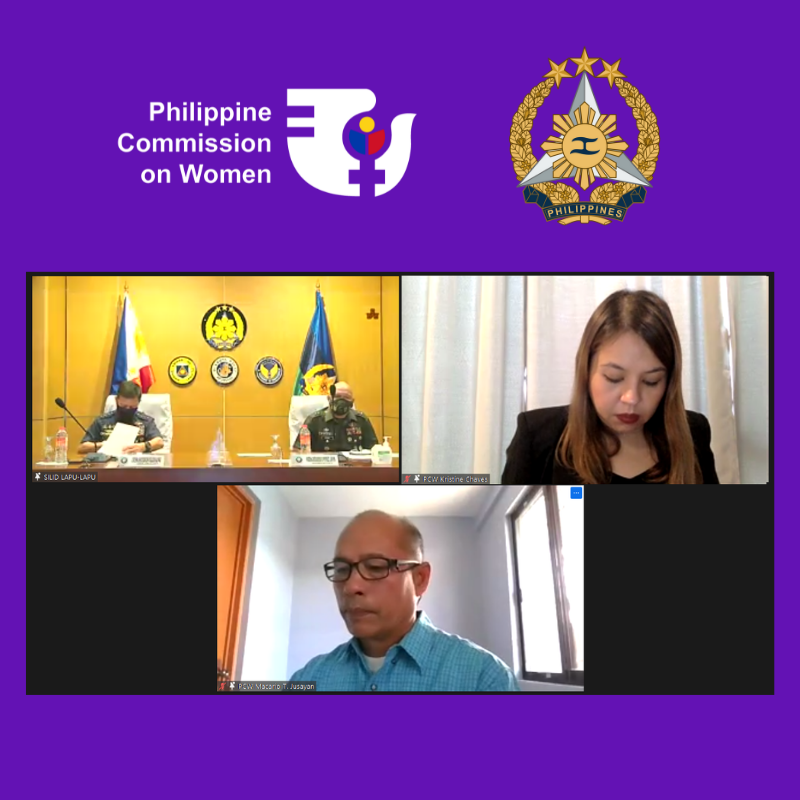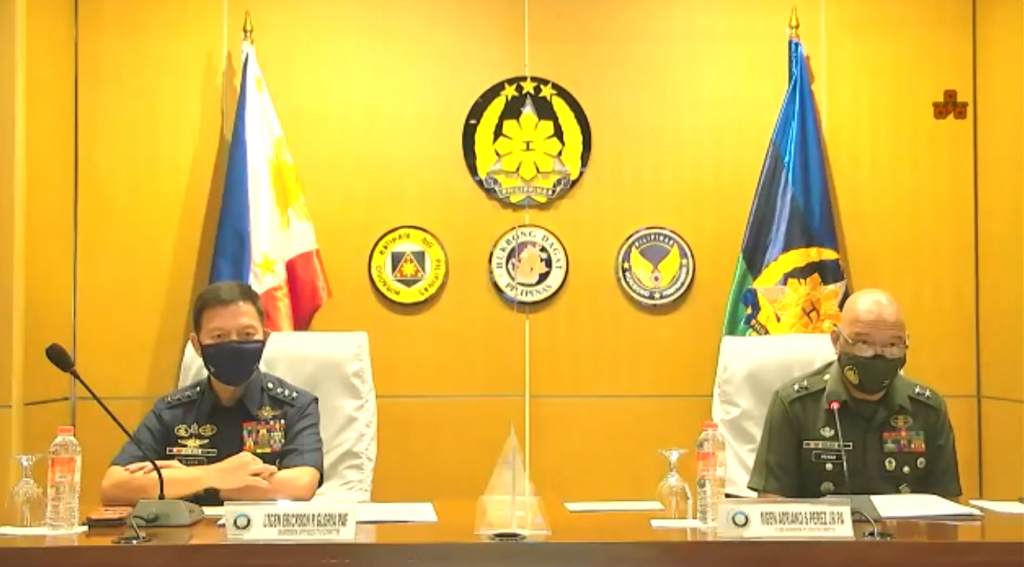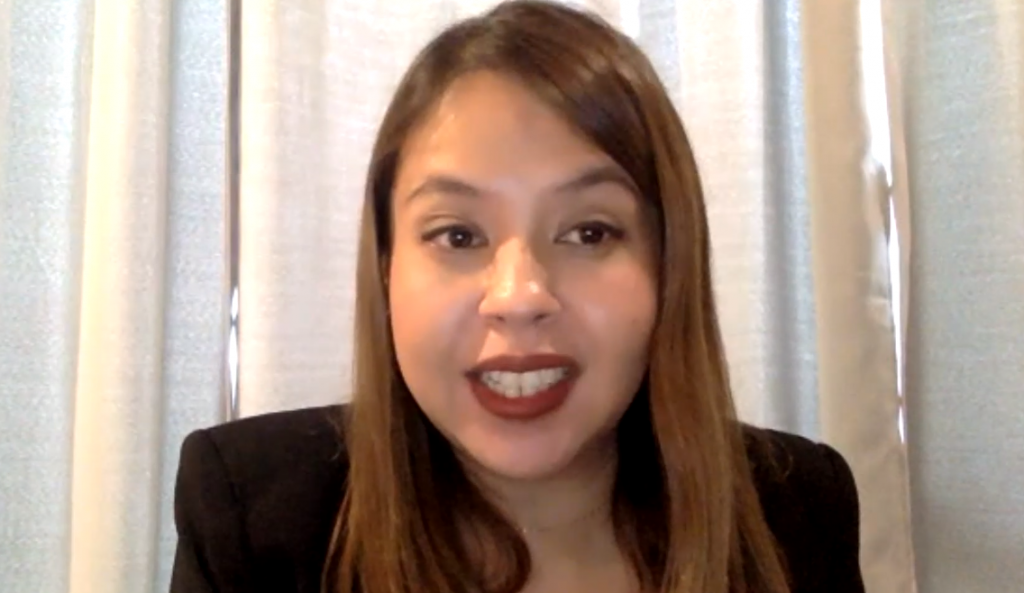PCW, AFP ink deal to strengthen gender mainstreaming in military

Setting another milestone in mainstreaming gender and development (GAD) concerns in the Peace and Security Sector, the Philippine Commission on Women (PCW) forged a partnership agreement with the Armed Forces of the Philippines (AFP) in a virtual signing ceremony held on September 14, 2021.
The partnership agreement aims to capacitate AFP personnel and all its major services including the Philippine Army (PA), Philippine Navy (PN) and Philippine Air Force (PAF), in terms of gender sensitivity and developing gender-responsive policies to mainstream GAD within the military.

In his welcome remarks, MGEN. Adriano S. Perez Jr. PA, Deputy Chief-of-Staff for Personnel, J1 and Co-Vice Chairperson of the AFP GFPS Executive Committee, expressed enthusiasm on how this pact can aid in efforts to achieve gender equality.
“This partnership agreement therefore will enhance our technical expertise not only in the effective and efficient implementation of the Magna Carta of Women in the AFP, but also in promoting gender equality. Furthermore, we are also optimistic that the signing of this agreement will enable us to craft and develop gender responsive policies and initiatives as part of our efforts to mainstream gender and development programs in the Armed Forces of the Philippines,” said MGEN Perez.

On the part of the PCW, Executive Director Atty. Kristine Rosary E. Yuzon-Chaves thanked the AFP for the willingness to further improve their GAD efforts and for being an active partner in pursuing gender equality and women’s empowerment.
“With this partnership, PCW commits to work with the AFP to ensure that the gender issues of both men and women military officers, including non-commissioned officers and non-uniformed personnel, and of course the general public, especially women and girls, are brought to the mainstream and addressed accordingly,” Yuzon-Chaves said.
Main Points of the PCW – AFP Agreement
Under the agreement, the PCW and AFP will work on the AFP-wide GAD Agenda Development. It also includes the conduct of Gender Analysis and Gender Analysis Tools Training, provision of technical inputs on GAD-related policies to be issued by the AFP, updating of the AFP’s Gender Mainstreaming Evaluation Framework Scores for 2020 and 2021 as well as the review and endorsement of 2022 and 2023 GPBs and 2021 and 2022 GAD ARs of all military agencies. Another goal is to harmonize the articulation of gender issues and standardization of Harmonized GAD Guidelines (HGDG) attachments for GAD Planning and Budgeting. Through these interventions, PCW will be able to assist AFP and its major services in sustaining its GAD programs to fortify AFP personnel’s capability towards providing GAD-related technical assistance to all AFP units and offices.
In her commitment speech, Atty. Yuzon-Chaves lauded AFP for its programs and projects in line with GAD. “Over the years, the military has implemented and sustained gender and development programs such as the submission of gender and development plans and accomplishment reports, application of the Gender Mainstreaming Evaluation Framework (GMEF), creation of GAD Offices and integration of gender and development perspectives in key programs of the military,” Yuzon-Chaves enthused.
To improve these efforts, remaining gender issues which were identified in PCW-AFP consultations must be addressed. These include: Fast turnover of AFP GAD Focal Point System members among the Peace and Security Sector agencies; Lack of an AFP-wide GAD Agenda ; Low utilization of the GAD Budget; Lack of gender-responsive billeting and quartering facilities for male and female uniformed and non-uniformed personnel; Inadequate availability of well-fitting personal protective equipment for female personnel, including, uniforms, firearms, etc; and low representation and participation of female personnel in decision-making positions within the AFP.
Data from the AFP show that only 17% or 2,655 out of 15,770 officers are female, while for enlisted personnel, women comprise only 7% or 8,499 of 30,033.
In his commitment speech, LTGEN. Erickson R. Gloria PAF, AFP Vice Chief-of-Staff and AFPGFPS Executive Committee Chairperson, speaking for Gen. Jose C. Faustino Jr. PA, Chief of Staff, recognized the need to evolve and address all concerns.
“Though we have achieved significant milestones on gender and development over the past years, it is still imperative that we continue to strive, to evolve, and innovate effective and responsive gender equality programs and advocacies in order for our organization to be truly gender-sensitive and a GAD-compliant military organization… Indeed, mainstreaming GAD Programs and gender-responsive policies within the AFP not only enriches the knowledge and perspective of our personnel, but also equips them to better promote peace and sustainable development in our country,” said LTGEN. Gloria.
Role of AFP in women, peace, and security (WPS)
The Magna Carta of Women (Republic Act No. 9710), under Section 15, reiterated the role of women in the military, police, and similar services. It provides for the equal promotional privileges and opportunities that must be accorded to women and men alike. Section 18 of MCW’s Implementing Rules and Regulations (IRR) further states that women in the service shall not be subjected to harassment and all forms of violence in all stages of their recruitment, training and service.
With this aim, PCW extends pro-active technical assistance to key implementing agencies, such as the AFP with major roles in the peace and security sector as enshrined in the MCW.
More specific mandates for the AFP can be gleaned from different provisions in the MCW”s IRR. For one, Rule IV, Section 12.B., stated that “Women shall have the right to protection and security in situations of emergency, armed conflict, and militarization,” and that AFP, together with other government agencies, must take special temporary measures to ensure the full participation of women in the planning and management of relief operations during these situations.
Still under the IRR, in Section 32, the AFP in coordination with LGUs, PNP, DOH, and DSWD shall institute measures for the protection of civilians in conflict-affected communities with special consideration of the specific needs of women and girls. These measures shall include, but are not limited to, the provision of the minimum initial service package (MISP) including adequate breastfeeding facilities, water and sanitation facilities, services addressing special needs of adolescents, and family planning.
With the inked agreement, the AFP will be more well-equipped, informed, guided, and inspired in fulfilling all these mandates. In turn, these will be a moving factor in empowering women in the security sector, which is one of the keys to an inclusive and progressive society, enveloped in lasting peace. The AFP is set to hold a GAD assembly on September 29-30, in line with the agreement as its pioneer activity.
In June 2021, the PCW entered into a similar agreement with the Philippine National Police, another implementing agency under the umbrella of the Peace and Security Sector. By fortifying gender mainstreaming in the agencies under this sector, the PCW continues to promote and encourage the building of a just, peaceful, and inclusive society.

